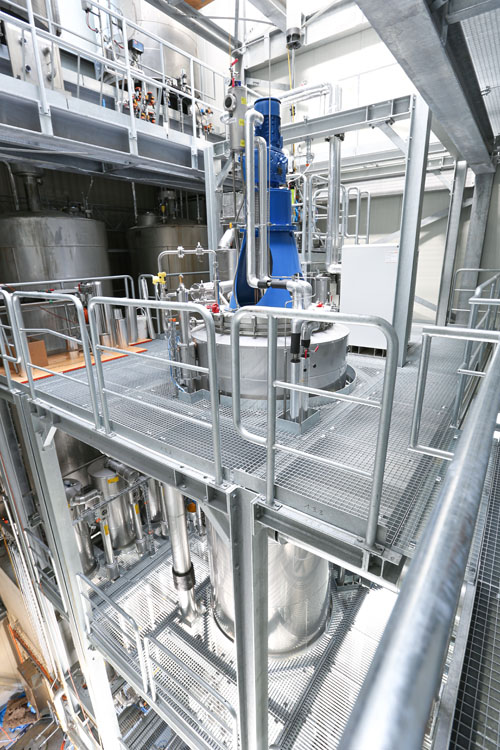Gentle refining not only preserves the natural components within edible fats and oils but also — through a series of precisely co-ordinated process steps — improves stability and purity.
The protection of valuable components such as vitamin E or unsaturated fatty acids is essential, especially when refining lipids for infant formulae.
Practical experience by Swiss-based Nutriswiss AG has shown that, when done correctly, modern distillation technology produces raffinates with higher vitamin content and a better shelf-life than classic deodorisation.
Mild distillation technologies can be used to efficiently remove or significantly reduce contaminants in fats and oils.
However, it’s important that product quality remains stable or is even improved compared with conventional processes. Nutriswiss has therefore done extensive tests to determine the ideal process parameters to achieve this goal.

With the use of this technology, volatile components (such as pesticides, free fatty acids and tocopherols) evaporate more easily under low thermal stress.
If the process is done correctly, and natural vitamin and antioxidant properties are preserved, the valuable components and stability of the oils are fully maintained. However, this requires extensive know-how and many years of experience.
Unlike conventional physical refining at high temperatures, which creates process contaminants and destroys valuable micronutrients, the thermal load in “mild refining” processes remains comparatively low.
Such techniques are therefore suitable for sensitive raw materials such as omega-3-rich seed oils, including rapeseed and linseed, as well as algae and other specialty oils.
The right blend and quality of oils, especially for infant formula, is a major challenge — not only because the fatty acid profile needs to be optimally balanced but also because the raw materials must meet the highest quality guidelines and strict specifications for harmful substances.
Such oils require individual treatment and a higher degree of care than ordinary oils to preserve essential fatty acids, micronutrients and vitamins during refining.
Benefits of natural tocopherol content
Tocopherols, commonly known as vitamin E, are divided into four forms: α- and β-tocopherols provide the highest vitamin functionality, whereas γ- and δ-tocopherols have a low vitamin content but strong antioxidant properties.
All four forms are present in vegetable oils in varying concentrations and have a positive effect on the storage stability of both fats and oils. They also provide protection against oxidation when heated (in frying oils, for example).
As valuable ingredients, tocopherols are therefore welcome from both a nutritional point of view as well as for product stability in specific applications. The content of tocopherol forms also depends on the type of oil.
For example, sunflower oil naturally contains more α-tocopherol and therefore has a higher vitamin E content; by contrast, rapeseed oil contains more γ- and δ- forms, and so has better antioxidant stability.
Controlled processing for optimal vitamin preservation
All stages of processing affect the stability of a fat, starting with the growing and harvesting conditions, the storage of the oilseeds and the subsequent pressing and storage of the oil.
During the refining process, the individual steps — from degumming, neutralisation and bleaching to deodorisation or special distillation — influence tocopherol content and storage stability. Depending on the process, antioxidants can also be affected to varying degrees.

As a rule, 20–50% of natural tocopherols are degraded during fat refining. Some of these are removed with the separated fractions but, depending on the process, they may also be degraded or converted to other compounds by chemical reactions such as esterification.
A large proportion of these natural vitamins and antioxidants are removed at the end of the refining process by classic deodorisation (a steam distillation process).
The use of mild distillation technology also reduces antioxidants along with fatty acids, which are subsequently found in the condensate. However, this process is much gentler on the product than deodorisation and offers other advantages.
The goal is to preserve as much natural vitamin and antioxidant content in the oil as possible through carefully controlled processing.
Experiments have shown that although tocopherols are lost in the refining process by separation or oxidation, regeneration or even an increase in tocopherol content is possible in certain process steps.
This can be explained by the cleavage of dimeric bonds between tocopherol molecules or ester bonds between tocopherols and other compounds.
The step analyses, conducted as standard at Nutriswiss after each refining step, revealed that, in some instances, even more tocopherols were found than were present in the original material. The refining processes have therefore been adjusted accordingly to take advantage of such effects.

Although up to 50% of the tocopherols were previously lost in some cases and no longer available in the final product, Nutriswiss now achieves no or significantly lower losses.
Here, Frank Möllering, Head of Research and Development at Nutriswiss, sees great potential. “Our optimised process shows positive effects for all oils and this is a clear technological advantage for us,” he says. “We have succeeded in preserving natural vitamin E using a controlled process.”
When unwanted by-products such as pesticides, herbicides, insecticides, plasticiser impurities or mineral oil saturated and aromatic hydrocarbons (MOSH/MOAH) must be separated from the crude oil by deodorisation or mild distillation, some loss of vitamins and antioxidants is unavoidable.
As such, it’s better to remove these valuable components from the highest possible starting point than from a tocopherol content that has already been cut in half.
For optimal results, the refining process must be co-ordinated across all treatment steps, depending on the oil to be refined and its initial analysis values, and must be as gentle as possible on the product.
Keeping oxidation in check
In practice, Nutriswiss has been able to show that, despite this unavoidable reduction in tocopherols, storage stability and vitamin E content are not affected by modern distillation technologies if the process is managed correctly.
Storage stability measurements such as the determination of the peroxide number (POZ) and the TOTOX number, which record the development of primary and secondary oxidation products, or the Rancimat test, which shows the stability of fats against atmospheric oxygen in comparative tests, showed no negative impact on molecular distillation compared with conventional processes such as deodorisation.
On the contrary, time to the onset of oxidation, which is characterised by the formation of secondary oxidation products such as aldehydes, ketones and short-chain fatty acids, was significantly prolonged.
As a result, POZ and Rancimat tests often yielded better results than conventionally refined oils.
In a specific comparative test conducted by Nutriswiss with a palm oil fraction that had been conventionally processed and then either deodorised or subjected to a gentle short path distillation, it was shown that the oxidation values of the sample from the short-path distillation increased much more slowly.
This was because of secondary oxidation products being removed in a “finer” and more sustained manner. The oil or fat enter storage with a lower load of oxidation products and, at the same time, their formation appears to be delayed and reduced.
Even though the underlying mechanisms of this observation have not yet been clarified, Frank Möllering is more than satisfied with the results of the mild refining process.
“Here, our many years of expertise in oil refining are paying off,” he says.
“Despite changing raw material properties and the balancing act between weak and intense treatment, we have honed the refining process to such an extent that we can preserve valuable ingredients and remove undesirable substances without impairing the stability of the end product.”
Nutriswiss AG processes result in contaminants and other undesirable ingredients being largely removed while a higher proportion of natural antioxidants and vitamins are retained.
Thanks to the gentle refining process, Nutriswiss fats and oils — depending on the type and batch — can be stored for as long or even longer than conventionally refined fats and oils.
By carefully selecting and managing the process parameters, the valuable ingredients are optimally protected and preserved, improving the health of both young and old.
